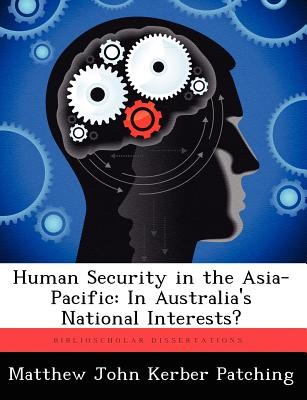
- We will send in 10–14 business days.
- Author: Matthew John Kerber Patching
- Publisher: BiblioScholar
- ISBN-10: 1249367085
- ISBN-13: 9781249367086
- Format: 18.9 x 24.6 x 0.6 cm, softcover
- Language: English
- SAVE -10% with code: EXTRA
Reviews
Description
Threats to security within the Asia-Pacific region continue to evolve. Traditional and non-traditional threats to state sovereignty and individuals exist across the region. Despite most recent security challenges being transnational, the dominant security policy within the Asia-Pacific region remains state-centric. This policy approach potentially generates instability by undervaluing the importance of individual security. The United Nations (UN) advocates human security as a means of providing freedom from want and freedom from fear for individuals. However, despite the altruistic motives of the UN, neatly separating traditional and human security is unrealistic, as sovereignty remains the foundation of the international system. Therefore, a human security policy approach must include the state-centric means available through instruments of national power. This research investigates whether application of such a human security policy approach is in Australia's national security interests. The research identifies that Australia's enduring national security objectives and interests are well defined and pursued using a state-centric policy approach. By analyzing case studies addressing threats in Northeast Asia, Southeast Asia, and the Southwest Pacific, the research concludes that a human security policy approach is in Australia's national security interests.
EXTRA 10 % discount with code: EXTRA
The promotion ends in 16d.16:14:33
The discount code is valid when purchasing from 10 €. Discounts do not stack.
- Author: Matthew John Kerber Patching
- Publisher: BiblioScholar
- ISBN-10: 1249367085
- ISBN-13: 9781249367086
- Format: 18.9 x 24.6 x 0.6 cm, softcover
- Language: English English
Threats to security within the Asia-Pacific region continue to evolve. Traditional and non-traditional threats to state sovereignty and individuals exist across the region. Despite most recent security challenges being transnational, the dominant security policy within the Asia-Pacific region remains state-centric. This policy approach potentially generates instability by undervaluing the importance of individual security. The United Nations (UN) advocates human security as a means of providing freedom from want and freedom from fear for individuals. However, despite the altruistic motives of the UN, neatly separating traditional and human security is unrealistic, as sovereignty remains the foundation of the international system. Therefore, a human security policy approach must include the state-centric means available through instruments of national power. This research investigates whether application of such a human security policy approach is in Australia's national security interests. The research identifies that Australia's enduring national security objectives and interests are well defined and pursued using a state-centric policy approach. By analyzing case studies addressing threats in Northeast Asia, Southeast Asia, and the Southwest Pacific, the research concludes that a human security policy approach is in Australia's national security interests.


Reviews